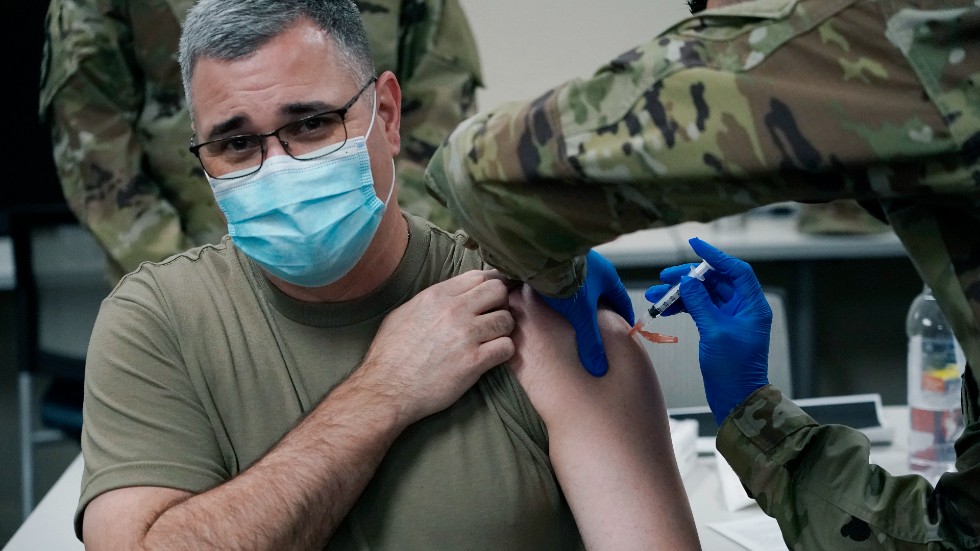Overnight Defense & National Security — Presented by Boeing — Pentagon vows more airstrike transparency

It’s Wednesday, welcome to Overnight Defense & National Security, your nightly guide to the latest developments at the Pentagon, on Capitol Hill and beyond. Subscribe here: digital-stage.thehill.com/newsletter-signup.
The Pentagon is working on two new reports following a series of tragic drone strikes that have killed dozens of women and children in Syria and Afghanistan.
We’ll share details of the reviews and the Pentagon’s vow for more transparency, plus an update on the annual defense authorization bill and where the Defense Department is in its effort to force the Oklahoma National Guard to adhere to its COVID-19 vaccine mandate.
For The Hill, I’m Ellen Mitchell. Write to me with tips: emitchell@digital-stage.thehill.com.
Let’s get to it.
Lloyd: Pentagon ‘must work harder’ after new report on civilian casualties

Defense Secretary Lloyd Austin on Wednesday said the Pentagon “must work harder” to reduce the civilian casualties that come from U.S. airstrikes and to reveal more information to the public about such military operations.
Austin told reporters that the Defense Department is in the midst of two reviews that will scrutinize how it conducts airstrikes and assesses their potential harm to civilians. He also committed to adjusting Pentagon policies and procedures “to make sure that we improve.”
“The American people deserve to know that we take this issue very seriously and that we are committed to protecting civilians and getting this right both in terms of how we execute missions on their behalf and how we talk about them afterward,” Austin said. “We have more work to do in that regard, clearly … and I’m committed to doing this in full partnership with our military leaders.”
A damning report: The Pentagon chief made the comments after the weekend release of an investigative report by The New York Times that detailed a 2019 U.S. airstrike in Syria that killed 70 civilians, including dozens of women and children, and allegations that top officers and civilian officials tried to hide the casualties.
U.S. Central Command on Tuesday confirmed the strike killed multiple civilians.
The two reviews: One of the Pentagon’s reviews, conducted by Rand Corp. and currently undergoing a security review, will assess the tragedy.
The second review — ordered by Congress in the 2020 National Defense Authorization Act — will take a wider, annual look at U.S. strikes and their harm to civilians and is due by May 1.
Austin has already been briefed on the Syria airstrike by U.S. Central Command head Gen. Kenneth McKenzie, who oversaw the air campaign in Syria, but he said he looks forward to reading the two studies and “benefiting from them as we conduct operations going forward.”
Other mistakes: The Pentagon is also still answering for how it handled an Aug. 29 drone strike in Kabul that killed 10 civilians, including seven children, instead of an Islamic State target. An initial Air Force inspector general investigation into the tragedy, released earlier this month, found errors were made in identifying the intended target but recommended no disciplinary action.
More work needed: Austin also stressed that “every civilian casualty is a tragedy” and said he has “no doubt that we can work harder, and I’d go beyond that and say we must work harder. I’m committed to adjusting our policies and our procedures to make sure that we improve, and I’ll be holding all our senior leaders responsible for putting those policies and procedures into effect as we go forward.”
A MESSAGE FROM BOEING
Boeing is helping the U.S. and its allies get ready for the future fight with digitally advanced, flexible real-time mission support to win at the speed of now. Learn more.
Senate GOP threatens to block defense bill

Republicans are threatening to prevent the Senate from taking up a massive defense bill as the chamber heads toward a Thanksgiving recess.
The Senate had been expected to vote on Wednesday to advance the bill toward the Senate floor, letting them start debate as soon as Thursday.
What’s the holdup?: Instead, Senate Majority Leader Charles Schumer (D-N.Y.) delayed the vote with Republicans warning they could block the bill amid pushback over Schumer’s decision to add an anti-China competitiveness measure to the larger defense package.
“We’re not ready for a motion to proceed,” said Sen. James Inhofe (R-Okla.), the top Republican on the Armed Services Committee. “I think he should be encouraged by the Democrats to not put the China bill in.”
Objections: Inhofe said the inclusion of the competitiveness legislation was the holdup. Asked if Republicans would block the bill from coming up for debate, Inhofe added: “Yes.”
Sen. John Thune (S.D.), the No. 2 Republican, added that Inhofe “has voiced his objections.”
“I suspect that will be kind of where the conference is,” Thune said. “Because they’re adding things … to the so-called four corners agreement on the defense bill and that they’re trying to put this in without consulting or working with Inhofe or others, I suspect that we would defeat the motion to proceed.”
Earlier: Schumer announced on Tuesday that he would include the China competitiveness measure in the National Defense Authorization Act (NDAA).
The GOP agitation about Schumer’s inclusion of the measure in the bill is multi-pronged.
Some Republicans are opposed to including the China legislation — which passed the Senate earlier this year but stalled in the House — in the defense bill.
Some of the frustration, according to aides, is that Republicans on the Appropriations Committee say they weren’t consulted about putting a bill under its jurisdiction into the defense bill, which authorizes but doesn’t appropriate money.
Warnings: House Armed Services Chairman Adam Smith (D-Wash.) warned that adding the China legislation into NDAA could slow down the defense bill.
“It’s an important piece of legislation and if we can get it done, that’d be great,” Smith told Defense News. “But it’s also a very large and very complicated piece of legislation with a lot of committee chairmen who are interested one way or the other.”
EARLIER: SANDERS VOWS TO OPPOSE DEFENSE BILL
Sen. Bernie Sanders (I-Vt.) is also unhappy with Schumer’s plan, and said Tuesday that he will vote against the defense policy bill.
“The Senate has spent month after month discussing the Build Back Better Act and whether we can afford to protect the children, the elderly, the sick, the poor and the future of our planet. As a nation, we need to get our priorities right. I will vote ‘NO’ on the National Defense Authorization Act,” Sanders said in a statement.
He also criticized a plan by Schumer to include the competitiveness legislation, which passed the Senate earlier this year but stalled in the House, into the defense bill, which sets broad spending and guidelines for the Pentagon.
Defense Dept. digs in on vaccine mandate

Oklahoma National Guard troops will not be allowed to avoid the military’s COVID-19 vaccine mandate, the Pentagon says, but it is unclear who will hold them accountable to the rule and what punishments, if any, will be handed down.
A Defense Department official on Wednesday reiterated the department’s message that it has the authority to mandate vaccines for troops in the name of medical readiness, a response to Oklahoma leaders who have stood firm in their vow that they will not enforce the vaccine mandate for their guard members.
The Pentagon’s stance: Defense Secretary Lloyd Austin “can establish a medical readiness requirement that applies to members of the National Guard,” the official told reporters, adding that if members fail to maintain such readiness, “it could jeopardize their status in the National Guard.”
“Whether or not a governor enforces that under his or her own authority is another matter, but [it] in no way relieves members of the National Guard from compliance with medical readiness requirements established by the secretary of defense and the secretaries of the military departments.”
Some background: Austin announced in August that the coronavirus shot would be mandatory for all troops and in mid-September placed the mandate into effect, though the deadline to receive the inoculation varies by branch.
The Oklahoma National Guard went rogue, however, when earlier this month it rejected the mandate after Oklahoma Gov. Kevin Stitt (R) unexpectedly ousted its previous head. In their place, Stitt appointed Army Brig. Gen. Thomas Mancino to serve as the state’s adjutant general and National Guard commander. He then directed Mancino to pen a memo that stipulated no member of the Oklahoma National Guard will be required to get vaccinated.
Two separate laws: At the center of the issue are two separate laws: Title 32 of the U.S. Code, which stipulates that a state or territory’s governor holds the power to mobilize their guard members unless those troops and airmen are activated for a federal mission; and Title 10 of the U.S. Code, where the president can mobilize the guard, placing them under federal authority.
The Pentagon says Guard members, while under Title 32, still must meet federal requirements to go to schools, train and deploy, which requires them to get the vaccine.
Unknowns: It is still unclear, however, how the Pentagon can force Oklahoma National Guard members to get vaccinated and how it can hold troops and their chains of command accountable.
“I’m not going to speculate on how any actions might actually be taken by the department in the future,” the Defense official said Wednesday.
A MESSAGE FROM BOEING
Boeing is helping the U.S. and its allies get ready for the future fight with digitally advanced, flexible real-time mission support to win at the speed of now. Learn more.
ON TAP FOR TOMORROW
- President Biden will host the North American Leaders’ Summit with Canadian Prime Minister Justin Trudeau and Mexican President Andrés Manuel López Obrador
- The Center for Strategic & International Studies will host a discussion on maritime security with Rear Adm. Tom Druggan of the Missile Defense Agency at 11 a.m.
- The Chatham House will host a discussion on “Negotiating with the Taliban” at 12 p.m.
- The Center for Strategic & International Studies will launch its report entitled “Pulling Back the Curtain on China’s Maritime Militia” at 1 p.m.
- The Atlantic Council will discuss a report entitled “State of the space industrial base 2021: Building space infrastructure and services for security and prosperity” at 3 p.m.
WHAT WE’RE READING
-
Outcry grows over Russian missile test that hit satellite
-
US resettles last Afghan refugees at Fort Lee
-
National Security Council stresses ‘conversations’ with China, ‘not arms control talks’
-
Chinese hypersonic missile test ‘went around the world,’ top US general says
-
Pentagon ups housing allowances in high-cost areas
-
Pentagon sending medical teams to Minnesota hospitals amid surge in COVID-19 cases
-
Ex-Marine ends hunger strike in Russian jail
-
The Associated Press: UN atomic watchdog: Iran further raising nuclear stockpile
-
Military Times: Veterans military sexual trauma disability claims still not being handled properly: watchdog
That’s it for today. Check out The Hill’s defense and national security pages for the latest coverage. See you Thursday.
{mosads}
Copyright 2023 Nexstar Media Inc. All rights reserved. This material may not be published, broadcast, rewritten, or redistributed. Regular the hill posts







